Законодательная власть и правоохранительная деятельность в Великобритании и США учебное пособие Уровень В1 Составитель
 Скачать 3.57 Mb. Скачать 3.57 Mb.
|
|
P 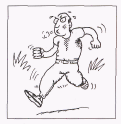 ut the verb in brackets in either the -ing form or the infinitive. ut the verb in brackets in either the -ing form or the infinitive.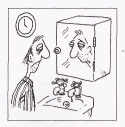 a I used ________ (think) that life ended at 40, but now I'm 41 I know it's not true. a I used ________ (think) that life ended at 40, but now I'm 41 I know it's not true.It's five in the morning. I'm not used to ________ (get) up this early. b Remember ________ (lock) the door when you leave the house. I remember ________ (fall) out of my pram when I was a baby. c Stop ________ (make) such a terrible noise. Carol stopped ________ (make) herself a cup of tea. d I mustn't forget ________ (buy) Jane a birthday card. I'll never forget ________ (meet) my husband for the first time. e I've always tried ________ (do) my best. If you can't do this exercise, try ________ (ask) a friend for help. f I started ________ (play) golf last year. Oh, look! It's starting ________ (rain). g I need ________ (speak) to you. The house needs ________ (painting). h Do you like ________ (cook)? I like ________ (cook) something special when guests come. I like ________ (pay) bills on time. Revision of infinitives and –ing forms 5. The house that Jack built Put the correct verb into each gap. Use either the infinitive or the -ing form.
J 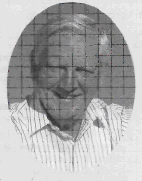 ack Baines is a self-made millionaire, but his beginnings were very lowly. He was the youngest of eight children. His father had a job in the cotton mills of Blackburn, Lancashire in the 1920s, but he was often unable (a) ________ due to poor health. The family couldn't afford (b)________ the rent or bills, and the children often went hungry. After (c)________ school at the age of 14, Jack was wondering what (d)________ when Mr Walker, his old teacher, offered (e) ________ him £100 to start his own business. ack Baines is a self-made millionaire, but his beginnings were very lowly. He was the youngest of eight children. His father had a job in the cotton mills of Blackburn, Lancashire in the 1920s, but he was often unable (a) ________ due to poor health. The family couldn't afford (b)________ the rent or bills, and the children often went hungry. After (c)________ school at the age of 14, Jack was wondering what (d)________ when Mr Walker, his old teacher, offered (e) ________ him £100 to start his own business.I 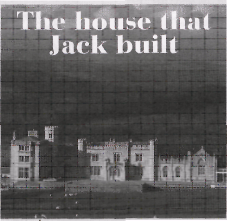 t was just after the war. Raw materials were scarce, and Jack (without (f) ________ to his parents' advice) saw a future in scrap metal. He bought bits of metal and stored them in an old garage. When he had built up a sizeable amount, he sold it to local industries for a vast profit. t was just after the war. Raw materials were scarce, and Jack (without (f) ________ to his parents' advice) saw a future in scrap metal. He bought bits of metal and stored them in an old garage. When he had built up a sizeable amount, he sold it to local industries for a vast profit. Jack enjoyed (g) ________ hard and was encouraged (h) ________ the most of his potential by Mr Walker. After one year he had succeeded in (i)________ the £100 loan and he also managed (j) ________ Mr Walker £100 interest to thank him for his generosity. B  y the time Jack was 30 years old he had made his first million, and he wanted (k) ________ this achievement by (l) ________ something 'grand'. With all his money it was now possible (m) ________ a beautiful home for himself and his parents . In 1959 'Baines Castle' was built in the heart of the Lancashire countryside. It was one of the finest buildings in the county. y the time Jack was 30 years old he had made his first million, and he wanted (k) ________ this achievement by (l) ________ something 'grand'. With all his money it was now possible (m) ________ a beautiful home for himself and his parents . In 1959 'Baines Castle' was built in the heart of the Lancashire countryside. It was one of the finest buildings in the county.Jack has recently sold 'Barnes Steel' for a staggering £500 million, but Jack still can't get used to (n) ________ the good life. He can often be found at the local pub drinking pints with the locals. 'I remember (o) ________ very poor as a child but never unhappy,' says Jack, 'and I never forget where I come from and who I am.' Lancashire people are proud of their local hero, and if a visitor asks the origins of the 'grand' castle on the hill the locals say 'Why, it's the house that Jack built'. /from New Headway English Course. Upper-Intermediate Workbook. Liz and John Soars/ See someone do/doing 6. Verbs of perception
A Complete the sentences with either the infinitive without to or the -ing form of the verb in brackets. a When I woke up, I could hear the birds __________ (sing). b But then I heard my brother __________ (slam) the bathroom door. c Soon I could smell bacon __________ (cook). d From our hotel window we could see people __________ (play) and __________ (sunbathe) on the beach. e I saw her __________ (pick) up the letter from the mat and __________ (rip) open the envelope. f When I got to the cinema, I spotted my friend __________ (wait) for me. g Over the years I watched the new airport __________ (build). h I knew the guests had arrived because I could hear them __________ (laugh) downstairs. i I've never seen anyone __________ (eat) as much as you do. j I noticed a girl __________ (shoplift). I saw her __________ (take) a bottle of perfume from a shelf and __________ (put) it in her bag. B Underline the correct form of the verb. 1. I noticed the man drop/dropping/to drop his ticket so I picked it up for him. 2. I heard the horses come/coming/ to come down the lane so I waited for them to pass before driving on. 3. The old man said he would love have/having/to have the chance to fly in the airplane again. 4. Don’t make the children come/coming/to come with us if they don’t want to. 5. I saw the boy jump/jumping/to jump into the lake before anyone could stop him. C Complete the sentences by using a suitable word. 1. He heard the phone __________ but it stopped before he could answer it. 2. When I entered his room I saw him __________ his homework. 3. Then I saw him __________ the house, __________ into his car and __________ away. 4. As they were walking past the house, they saw it __________ into flames. 5. I saw Freddie Ljunberg __________ the winning goal for Arsenal in the FA Cup Final. /adapted from Developing Grammar in Context. Mark Nettle, Diana Hopkins/ Vocabulary Law 1. Look at the expressions in the box below. Which means...
2. Complete these sentences with the expressions in 1.
/Inside Out. Advanced. Student’s Book. Ceri Jones, Tania Bastow, Sue Kay and Vaughan Jones/
1. Without unwritten _______________ civilized life would be impossible. 2. If they entered the building they would be breaking the _________________. 3. This explains the _______________ under which the library operates. 4. In Sweden it is against the __________________ to hit a child. 5. British schools are now required by ______________ to publish their exam results. 6. Under the new _________________ spending on office equipment will be strictly controlled. 7. The reforms have recently become __________________. 8. Do not think you are above the ________________? 9. It is a _________________ of the sea to help another boat in distress. 10. There are strict __________________ governing the sale of weapons. 11. The golden _______________ in tennis is to keep your eye on the ball. /adapted from Oxford Adavanced Learner’s Dictionary/ Unit 2 Grammar Spot Reported statements and questions 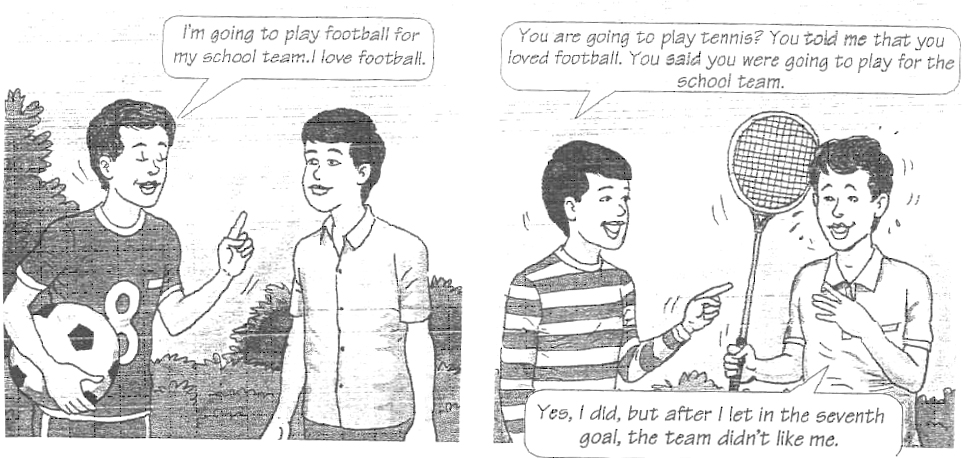
Say – Tell – Ask
1. Fill in: say, tell or ask in the correct form. First the headmaster 1) said good morning. Then he 2)__________us that the police had been 3)________ questions about hooliganism at school. The police 4)_________ that some pupils had been breaking windows. Several boys were 5)________ if they knew anything, but of course they 6)_________nothing. They were probably 7)_________ lies. The headmaster 8)________ us all for information. He 9)_________we must 10)__________ him the names of those involved. Well, I know who they were. But I can’t 11) _________ him the secret. 12)________ the truth is not always easy, is it? 2. Underline the correct item.
|

 (Direct Speech) “I can fix it,” he said. (Reported Speech) He said he could fix it.
(Direct Speech) “I can fix it,” he said. (Reported Speech) He said he could fix it. He said to me, “Please, don’t go!”He asked me not to go.
He said to me, “Please, don’t go!”He asked me not to go. We can use say + to-infinitive but never “say about”. We use tell sb, speak/talk about, instead.
We can use say + to-infinitive but never “say about”. We use tell sb, speak/talk about, instead.
